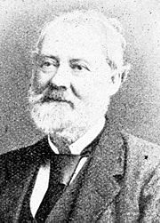
Charles Reade
Topics
Charles Reade
Quotations

Quotations
Charles Reade was an English novelist and dramatist.
Sourced
- Well, every one for himself, and Providence for us all--as the elephant said when he danced among the chickens.
- A Simpleton (1873)
Christie Johnstone (1853)
- The fortunate man is he who, born poor, or nobody, works gradually up to wealth and consideration, and, having got them, dies before he finds they were not worth so much trouble.
- CHAPTER I.
- What young woman is not, more or less, a mirror?
- CHAPTER I
- Art is not imitation but illusion.
- CHAPTER XII.
Peg Woffington (1853)
- First, think in as homely a way as you can; next, shove your pen under the thought, and lift it by polysyllables to the true level of fiction
- CHAPTER I
- In players, vanity cripples art at every step.
- CHAPTER I
- It must be confessed that a sort of halo of personal grandeur surrounds a great actress.
- CHAPTER I
The Cloister and the Hearth (1861)
- Not a day passes over the earth, but men and women of no note do great deeds, speak great words, and suffer noble sorrows.
- CHAPTER I
- …even Christians loved one another at first starting.
- CHAPTER I
- Lower a bucket into a well of self-deception, and what comes up must be immortal truth, mustn't it?
- CHAPTER V
- Courage, mon ami, le diable est mort! / Take courage, my friend, the devil is dead!
- CHAPTER XXIII
Attributed
- Make 'em laugh; make 'em cry; make 'em wait.
- Advice given to a aspiring writer
- Sow an act, and you reap a habit. Sow a habit and you reap a character. Sow a character, and you reap a destiny.
- Possibly a misattribution, ascribed to Reade in Notes and Queries (9th Series) vol. 12, 17 October 1903. It appears (as an un-sourced quotation) in Life and Labor (1887) by Samuel Smiles and in the front of The Power of Womanhood by Ellice Hopkins (1899) (ISBN 1421956128)http://www.gutenberg.org/files/16047/16047-h/16047-h.htm as well as in the text (i.e., as part of the text, and not in quotation marks) in both (1909) R. Dimsdale Stocker, Brain-Culture or Phrenometry: Auto-Suggestion and Cerebral Stimulation, What It Is, and How It's Done (Second, Revised Edition), L.N. Fowler, (London), and (1919) Youth and Sex by Mary Scharlieb and F. Arthur Sibly (ISBN 1414250800)http://www.gutenberg.org/files/13722/13722-h/13722-h.htm.
- Apparently a common saying in 19th century. It has been also attributed to an “old Chinese proverb”, Ralph Waldo Emerson (1803-1882), William Makepeace Thackeray (1811–1863), George Dana Boardman (1828-1903), Frances Elizabeth Caroline Willard (1839-1898), James Allen (1864-1912), Marcus Fabius Quintilianushttp://www.worldofquotes.com/author/Quintilian-(Marcus-Fabius-Quintilian)/1/index.html and William James.
- No original source has ever been isolated. Its structure strongly reflects that of a "classical Chinese" set of aphorisms; and it may have been deliberately constructed in that form, by a non-Chinese, to imply an oriental (and, perhaps, far wiser) origin.
- Finally, almost all of those who cite the complete piece:
-
- We sow a thought and reap an act;
- We sow an act and reap a habit;
- We sow a habit and reap a character;
- We sow a character and reap a destiny.
-
- state that, in their view, it was written to expand an embellish the notion that was expressed at Proverbs XXIII:7 ("For as he thinketh in his heart, so is he").
Silverdale Interactive © 2026. All Rights Reserved.

